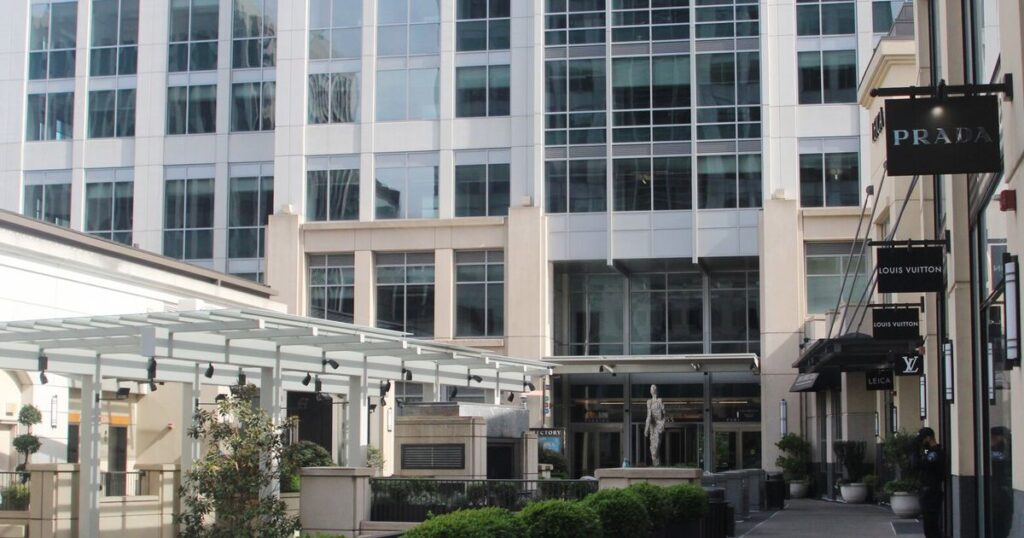The Australian Retirement Trust, the nation’s No. 2 pension fund, is defaulting on a loan that funded the purchase of a Bellevue office complex once occupied by Microsoft, underscoring the continued fallout for global investors as companies revise their office space.
The two towers seemed like a safe bet for their Australian buyer in early 2020, packed with thousands of Microsoft workers. But the tech giant vacated the complex as hybrid work trends and job cuts allowed it to consolidate offices in the years following the pandemic, leaving both buildings empty in an area where nearly a fifth of space is now vacant.
The mortgage on The Bravern complex in Bellevue was transferred to a special servicer this month after Microsoft’s lease expired in August, according to filings on the debt. ART has no plans to refinance the property, the filings show, leading to a likely foreclosure or distressed sale at a steep discount and potentially exposing bondholders to losses.
Defaulting on the loan likely wipes out a roughly $300 million equity investment for ART, according to Bloomberg calculations. A spokesperson for the pension fund, which manages about $230 billion of Australians’ retirement savings, declined to comment. A spokesperson for Microsoft also declined to comment.
While The Bravern complex represents a tiny portion of ART’s sprawling portfolio, the loss is a cautionary tale for Australia’s pension funds as they ramp up their offshore investments in private markets. Around half of the biggest funds’ assets are now overseas as the fast-growing $2.8 trillion industry outgrows its own backyard and is increasingly seen as a global investment powerhouse.
Debt filings show The Bravern complex was valued at $605 million just before its January 2020 purchase by QSuper, which later merged with Sunsuper to form ART. The deal was partly funded by a $304 million loan that was packaged into commercial mortgage-backed securitizations. The asset is now worth closer to $268 million, ratings service Morningstar DBRS reported in August.
The wipeout illustrates the continuing U.S. office carnage, as debt defaults surge. Some 16.9% of U.S. office CMBS deals were in special servicing as of August — the highest of any property type and up from 2.5% in late 2019, Commercial Real Estate Finance Council data shows. While there are some signs of office recovery in Seattle and Bellevue, they haven’t come fast enough for owners holding buildings in some cases worth a fraction of their loan value.
Microsoft chose not to renew more than 2 million square feet of Bellevue office leases, including The Bravern towers, as it moved regional employees back to its redesigned Redmond campus. Some of that space has been leased by other tech companies, including OpenAI and TikTok, but the size of the gap left by Microsoft helped push Bellevue’s vacancy rate above 17% in the second quarter, according to Broderick Group.
The two Bravern towers with 750,000 square feet of space flank a city block that includes apartment buildings and luxury stores like Hermes, Gucci and Prada. In the lobby of Bravern Building One, the elevators are turned off. John Howie Steak, where one can order a 6 ounce Japanese Wagyu filet mignon for $189, is closed for the lunchtime hour.
At Chinese restaurant Jiang Nan, the first West Coast location for New York’s high-end chain, only one table was occupied on a September afternoon. The restaurant, also in The Bravern lobby, opened in March, after Microsoft had already moved most of its workers out of the building.
The tech giant initially moved into The Bravern towers when the project was completed in 2009. Microsoft was the sole tenant and invested $181 million of its own capital into outfitting the buildings. Fitch downgraded the debt in December as Microsoft’s exit was already underway, citing “limited property leasing activity and challenged submarket conditions in Bellevue.”
One of the largest owners of the securitized Bravern debt is Pacific Investment Management, according to data compiled by Bloomberg as of June 30, but it’s uncertain whether Pimco will lose money on its stake.
“As an active participant in secondary CMBS markets, it’s worth noting that Pimco often invests in distressed securities that are priced at a deep discount,” a Pimco spokesperson said in an email.

